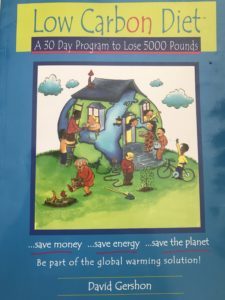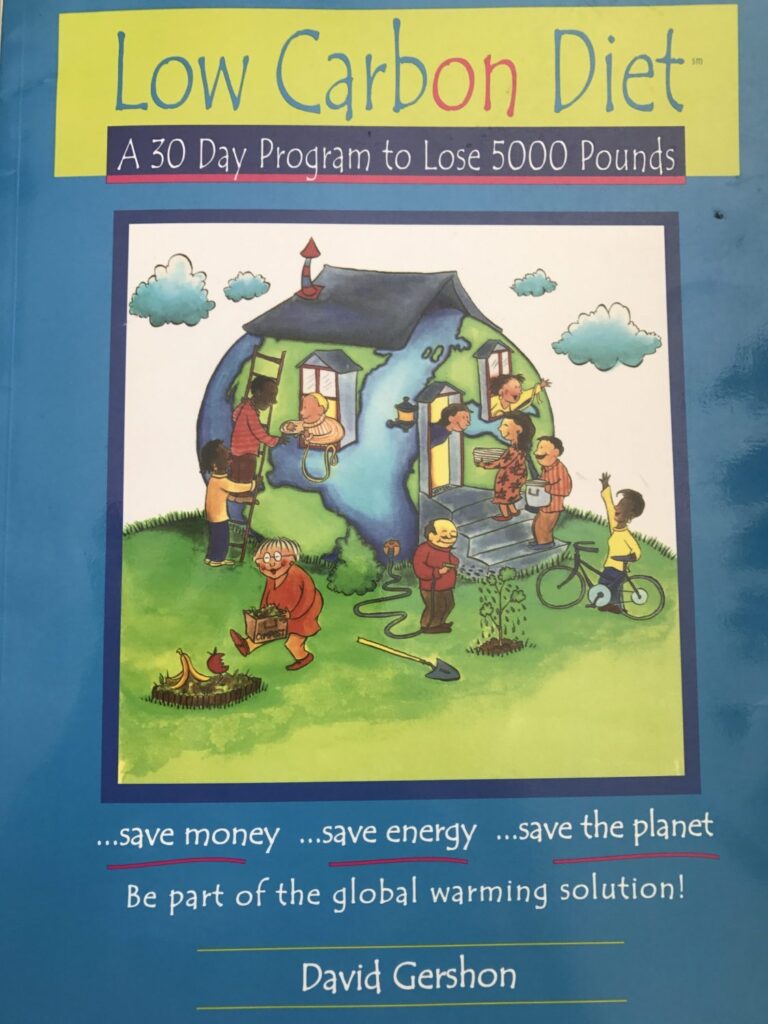
Actually, I shaved more than that off my carbon footprint. And I’m going to tell you how.
A couple months ago, a friend showed me the “cool community” program and talked me into starting a local group. The idea is that you get a group of 5-8 neighbors to get together and do a carbon-reduction workbook called “The low-carbon diet”. We wanted to get it started in Asheville so we got a group of eight committed environmentalists to test drive it. Most of us thought we were doing pretty well (several of us even have solar on our roofs), and since the program is pretty basic, we didn’t expect to get a lot out of it personally. Boy were we wrong!
The program IS really basic. You can do the program even if you don’t have much (or any) money to spend on energy upgrades. The most “handyman” thing the program asks you to consider doing is change a showerhead. And there’s nothing you have to do – it’s “choose your own adventure”. But the program is also really powerful. It was developed by The Empowerment Institute, an organization that studies how and why people change. They have found that the average participant decreases their carbon footprint by 25%.
We were all surprised by how fun the program was. Our goal was to meet 4 times over 8 weeks. As we shared our successes and the ways we were getting hung up, we realized that each of us was an expert at something: home energy, gardening, food production, internet research, canning, and even sewing. So now we each have our own stable of experts that we can call when we want to do something that’s new to us. We also realized that the power of group brainstorming is really powerful – we came up with some good ideas that I never would have dreamed on my own. We really did develop a community.
What were some of our successes?
Showering was an area where a lot of us had been resistant to making a change. One person had even tried a low-flow showerhead and didn’t like it. I was able to talk her through buying the right showerhead (if you get a good one, it’s actually a higher-pressure shower that feels great). She tried it again (this was the one she selected) and loved it. Someone else in the group shared that she started timing her showers to two songs on the radio, a change that turned out to be really fun and helpful for those who wanted to try shorter showers.
One of the group members spent several hours researching the different types of power strips that could be used to reduce vampire loads. He explained to us which type worked best for cell phone chargers, computers, and AV equipment. He also bought a meter to measure the vampire power that his home appliances were using that he let other members of the group borrow.
I was reminded of the little stuff that really adds up. Was I using my clothesline as much as possible? Was I combining trips when I could? Had we bought new appliances that needed to be checked for vampire power? This is about ongoing awareness, so it really helps to have the support and encouragement of friends.
Some of us also decided to offset our carbon emissions, and we got local and creative about how to do that. Some of us volunteered with Energy Savers Network to offset using sweat equity. I chose to donate to Appalachian Offsets. Others bought green power through Arcadia.
One of the group members has already had an electricity bill that was 30% lower than last year at this time. Another member also just got her bill and it was lower also. So the program does work in Asheville.
We have three new groups forming soon, so you can get on this train. If you’re new to energy efficiency and haven’t changed your light bulbs yet, this program was designed for you. If you’ve been in this game for decades, this program has a lot to give you too. Contact the WNCGBC for more information: 828.254.1995
Copyright 2017. Amy Musser


